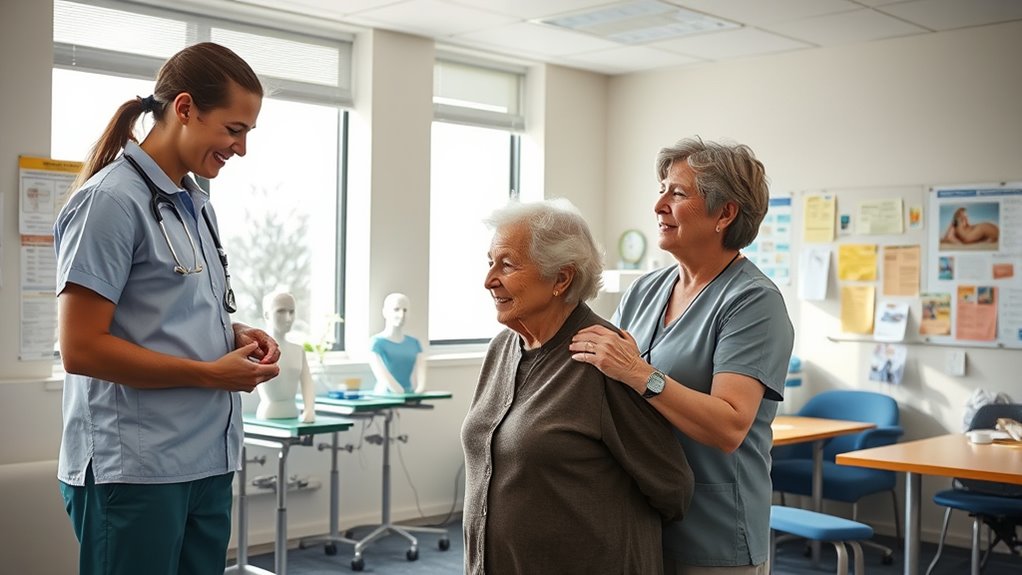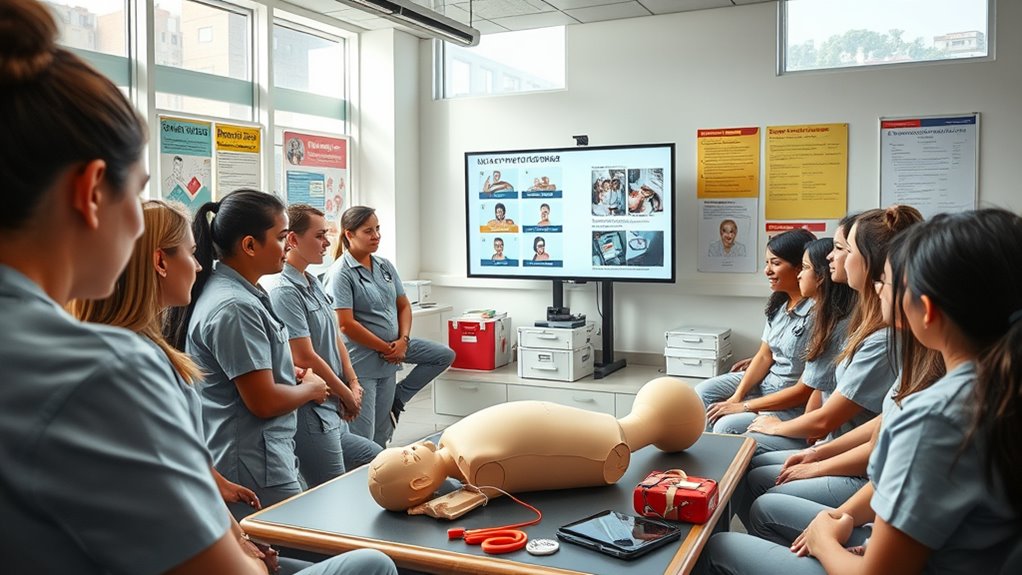To provide high-quality elder care, you should pursue essential training programs like caregiver certification courses and specialized workshops. These programs validate your skills, improve your knowledge of safety, medication management, and emergency response, and keep you updated on the latest best practices. Workshops focused on senior-specific needs can boost your confidence and practical skills. Continuing with these programs guarantees you stay professional and well-prepared—discover more ways to enhance your caregiving expertise below.
Key Takeaways
- Certified caregiver training programs validate essential skills like safety, medication management, and emergency response for quality care.
- Elder care workshops focus on aging-specific needs, including fall prevention, mobility support, and chronic condition management.
- Ongoing training ensures caregivers stay updated on best practices and innovative techniques in senior care.
- Hands-on workshops enhance practical skills, boosting confidence and professionalism in caregiving roles.
- Combining certification and specialized workshops demonstrates commitment to high standards and improves employment opportunities.

Caregivers play a pivotal role in supporting the health and well-being of those they care for, but proper training is indispensable to guarantee they provide the best possible assistance. One of the most effective ways to ensure you’re prepared is by obtaining a caregiver certification. This certification validates your skills and knowledge, giving you credibility and confidence in your caregiving abilities. Many training programs now emphasize certification because it often serves as a benchmark for quality and professionalism in the caregiving industry. When you pursue caregiver certification, you’re not only learning essential skills but also demonstrating your commitment to high standards of care. Certification programs typically cover essential topics like safety procedures, medication management, and emergency response, equipping you to handle a wide range of situations with competence.
In addition to certification, participating in elder care workshops can greatly enhance your caregiving skills. These workshops are designed to address the unique needs of older adults, focusing on issues such as mobility assistance, fall prevention, and managing chronic conditions like arthritis or diabetes. Attending elder care workshops helps you stay current on the latest best practices and innovative care techniques tailored specifically for seniors. These sessions often include hands-on training, allowing you to practice skills under supervision, which boosts your confidence and competence. Plus, elder care workshops are a great opportunity to connect with other caregivers, share experiences, and learn from experts in the field. The peer support and networking can be invaluable, especially when facing challenging situations. Understanding the physical and emotional changes during pregnancy can also improve your ability to care for individuals experiencing these transitions, even if your primary focus is on other populations.
Both caregiver certification and elder care workshops are integral parts of a thorough training program. Certification provides a solid foundation of knowledge and a formal recognition of your skills, which can be beneficial if you’re seeking employment or advancing your career. On the other hand, elder care workshops deepen your understanding of specific needs related to aging, helping you deliver more personalized and effective care. Combining these two approaches not only improves your technical skills but also enhances your overall confidence and professionalism. Remember, investing in quality training programs shows your dedication to providing compassionate, competent care. It helps you stay informed about evolving standards and guarantees those you care for receive the safest, most effective assistance possible. Whether you’re new to caregiving or looking to refine your skills, participating in these programs is a smart move toward becoming a more skilled and confident caregiver.
Frequently Asked Questions
Are Online Training Programs as Effective as In-Person Courses?
You might wonder if virtual learning is as effective as in-person courses. It can be, especially if the program offers engaging content and interactive elements. While virtual learning provides flexibility, hands-on practice can be limited. To maximize your skills, choose programs that include simulations or live demonstrations. Ultimately, your dedication and the program’s quality play big roles in how well you learn and apply your caregiving knowledge online.
How Often Should Caregivers Renew Their Certification?
You should renew your certification based on the renewal requirements set by your certifying organization, typically every one to three years. This guarantees your certification remains valid and up-to-date. Staying current with certification validity helps you maintain your skills and meet industry standards. Regular renewal also demonstrates your commitment to providing quality care, so check your specific renewal requirements to stay compliant and continue offering excellent support to those you care for.
Are There Specialized Training Programs for Dementia Care?
Imagine transforming your ability to connect deeply with dementia patients! Yes, there are specialized training programs for dementia care that focus on mastering dementia communication and behavioral management. These programs equip you with the skills to handle challenging behaviors with patience and empathy, making a profound difference in your patients’ lives. By learning these techniques, you become not just a caregiver, but a beacon of comfort and understanding for those with dementia.
What Financial Assistance Is Available for Caregiver Training?
You might wonder about financial aid options for caregiver training. Many organizations offer grant opportunities and assistance programs to help cover costs. You should explore local and national resources, such as government grants, nonprofit grants, and employer-sponsored programs. These financial aid options can substantially reduce your training expenses, making it easier for you to access essential caregiver programs and improve your skills to provide better care.
Can Caregivers Receive Training in Emergency Medical Procedures?
Imagine being the hero in a crisis—you can be, with proper training. As a caregiver, you can absolutely learn emergency medical procedures like First Aid and CPR certification. These skills empower you to respond confidently in emergencies, potentially saving lives. Many organizations offer courses designed specifically for caregivers, so you’re prepared when it matters most. Don’t wait for an emergency to learn; get certified and be ready to act swiftly and effectively.
Conclusion
By exploring these essential training programs, you’ll become an unstoppable force in caregiving, ready to handle any challenge that comes your way. Think of yourself as a superhero equipped with knowledge that can turn chaos into calm and despair into hope. These programs aren’t just lessons—they’re your secret weapons, transforming you into a caregiver so skilled, even the toughest days will feel like a walk in the park. Embrace them and watch your confidence soar!









